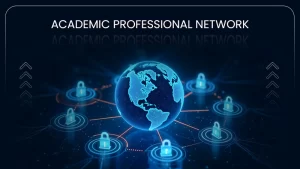
In the fiercely competitive academic climate of today, establishing a strong professional network is not only a plus – it’s a requirement. Whether studying at a London, Manchester, or any other UK university, 16- to 30-year-old students are starting to appreciate the long-term benefits of networking for scholarly development, career advancement, and even getting through short-term challenges such as group work, dissertation preparation, and finding assignment help when needed.

This book deconstructs actionable strategies, advice, and observations to assist students in cultivating a healthy academic network – both offline and online – without being intrusive or uncomfortable. No fluff, no waxy motivational stuff, only actual, tangible moves that can have an enormous impact.
Why Academic Networking Matters
A solid academic professional network opens doors that textbooks cannot. From accessing collaborative learning opportunities to locating mentors or learning about career opportunities, the value extends far beyond the lecture hall. Some of the most direct benefits include:
- Improved learning outcomes through study groups and peer critique.
- More exposure to lecturers and professionals within your profession.
- Internship, job, and reference opportunities.
Networking isn’t reserved for postgrads or PhD candidates. Even college and undergraduate learners can get ahead of the competition by having connections to the right people in the right academic groups.
Where to Begin: A Study of the Academic Network
Before jumping into strategies, it is useful to have some idea about what an academic professional network may be made up of. Here’s what a well-rounded academic network might look like
- Lecturers, professors, and tutors
- Coursemates and peers
- Student society leaders
- Industry professionals relevant to your industry
- Academic advisors or mentors
- Online subject matter experts and educational content producers
- Assignment aid providers and academic services (ethical usage only)
Each of these groups has the potential to serve a distinct function in providing support, opening doors, or increasing your learning potential.
Building Connections Within Your University
Engage Beyond the Lecture Hall
Attending class is important – but true networking happens after meeting and interacting beyond attending lectures. This includes:
- Attend seminars with thoughtfully prepared questions
- Attend office hours to ask in-depth questions or discuss coursework
- Volunteering on research projects even if they are not for your module
- University society membership, particularly those associated with your course
By contributing to your learning environment in this way, others will notice you for your initiative and motivation.
Study Groups and Peer Collaboration
One of the simplest ways to begin networking is through forming or joining a study group. It’s not simply about revising for exams; it’s an opportunity to share resources, exchange ideas, and even offer assignment help to fellow students, strengthening both academic understanding and professional relationships.
- Establish peer trust
- Share thoughts and insights
- Give and receive criticism on projects or essays
- Understand how other people work through tasks or obtain assignment assistance
- Study groups become casual scholarly networks that aid one another far after graduation.
Leverage Online Networking Tools
As the world gets more digital, there’s no need to keep networking within the campus.
Using LinkedIn for Students
LinkedIn isn’t solely meant for suits – students can use it strategically by:
- Building a solid profile with academic credentials
- Networking with peers, lecturers, and alumni
- Following universities, researchers, and professional networks
Sharing academic milestones, research interests, or even successful assignment submissions (where applicable)
A well-updated LinkedIn profile can result in collaborations, mentorship opportunities, or internship invitations.
Academic Forums and Online Communities
Sites such as ResearchGate, The Student Room (UK-focused), and Reddit forums such as r/UniUK are full of tips, Q&A posts, and peer-to-peer advice. These can be beneficial for:
- Asking career questions
- Talking about study techniques
- Finding ethical assignment assistance and resources
- Discussing various university experiences
Participating in these forums can make your name synonymous with being a resourceful and cooperative learner.
Academic Events and Conferences
University-Led Events
A vast majority of UK universities have guest lectures, research symposia, and industry speaker events lined up during the academic year. These are treasure troves of:
- Meeting experts in your chosen profession
- Uncovering academic avenues like assistantships or scholarships
- Popping the question in public to increase exposure
Get in the habit of scanning your university’s events calendar – and attending, even if it’s only for the novelty.
National and Virtual Conferences
Undergraduates typically think academic conferences are for postgraduates or professors only. Not so. There are a number of undergraduate-targeted or student-friendly conferences throughout the UK, particularly in Edinburgh, Leeds, and Birmingham.
Online conferences, especially post-COVID, also count. They are time-saving, save money on travel, and enable students to:
- Interact with experts from all over the UK
- Display academic posters or essays
- Discuss important issues such as research structure, study techniques, or assignment aid tools
Building a Personal Academic Brand
A “personal brand” may seem like something for influencers, but it can be used in an entirely academic context. Here’s how:
Define Your Academic Interests
Specialize in your niche: Do you have a passion for climate justice, postcolonial literature, AI in education, or public health policy? Publicizing your area of interest assists in bringing similar peers and mentors to your network.
Share Your Knowledge
Begin a blog, write for university publications, or even guest-write on applicable platforms. Share academic thoughts, provide essay advice, or outline how you allocate your time. These writings:
- Establish academic credibility
- Amplify your online presence
- Draw connections who value your perspective
Organically include pertinent subjects into your writings. The ability to write about the advantages and disadvantages of assignment assistance, for instance, can provoke discussion and participation (as long as it’s performed ethically).
How to Approach Academic Professionals
Initiate Contact Professionally
When contacting a lecturer, researcher, or prospective mentor:
- Use university emails, not DMs
- Be concise and specific in your message
- Declare your purpose (e.g., feedback on an idea, interest in a research group, or interest in their work)
- Academic professionals appreciate students who take the initiative and express real interest.
Follow Up and Maintain the Connection
Following a first meeting, don’t allow the relationship to become stale. A quick follow-up email or a casual check-in at office hours ensures you stay on their minds. In the long run, they may:
- Give you academic recommendations
- Recommend you for internships
- Give you final-year project guidance
Networking Mistakes to Avoid
Academic networking is as much about what not to do as what to do. Here are some of the most common mistakes to avoid:
- Being too transactional – Don’t just reach out when you need something (e.g., last-minute assistance on an assignment).
- Ignoring peers – Networking isn’t all about reaching up. Coursemates of today could be industry leaders tomorrow.
- Not following up – One conversation doesn’t create a relationship.
- Sharing personal problems – Keep things professional and related to learning development.
Leveraging Assignment Help and Study Support
When to Seek Help
At times, academic workloads get too much – particularly during exam times or final-year projects. That is where professional services providing assignment assistance can be a relief, as long as they are used ethically and as a learning aid.
Academic networking can actually assist you in determining which services are reliable. For example, peers and mentors may suggest sites that provide:
- Writing assistance
- Proofreading and editing
- Citation verification
- Topic brainstorming help
Balancing Support with Integrity
Academic honesty is still a priority. Responsibility in using assignment assistance includes:
- Never presenting work done by another as your own
- Applying guidance to develop your own expertise
- Keeping assistance as an aiding tool, never a cut shortcut
- A close academic network promotes this by teaching accountability and honorable practice.
Creating and Sustaining Your Network
Establishing a network is just the initial step – upkeep is just as important.
- Stay in touch: Leave messages, post updates, or comment on other people’s academic accomplishments.
- Give more than you get: Give assistance, suggest resources, and congratulate others’ success.
- Organize yourself: Employ LinkedIn, Google Sheets, or even a note-taking app to maintain records of contacts.
The course is to be someone whom others appreciate in their network. By and by, that reciprocal benefit rewards itself in academic achievement, career breakthroughs, and lifelong learning.
Conclusion
Networking is not something to be crossed off a checklist or a temporary fix. It’s an on-going process that, when approached with authenticity and intention, can bring about phenomenal results — from improved grades and meaningful dialogue to internships and career beginnings.
Along the way, it’s also good to have academic support mechanisms in place. For time management or writing struggles, tools like Assignment in Need (assignnmentinneed.com) provide straightforward, ethical assignment assistance to supplement a student’s own work. Used responsibly, they can be an extension of a broader academic success plan.
In short, the relationships built now — with peers, lecturers, and professionals — will shape not just the academic journey, but the future career path too. Start today, stay consistent, and build smart.






